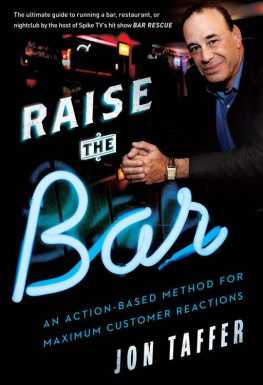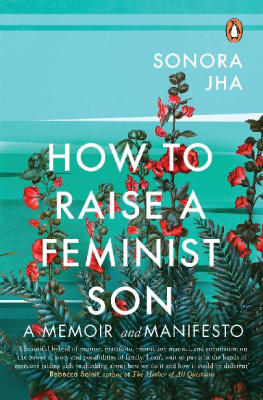Jon Taffer - Raise the Bar
Here you can read online Jon Taffer - Raise the Bar full text of the book (entire story) in english for free. Download pdf and epub, get meaning, cover and reviews about this ebook. year: 2013, publisher: New Harvest, genre: Home and family. Description of the work, (preface) as well as reviews are available. Best literature library LitArk.com created for fans of good reading and offers a wide selection of genres:
Romance novel
Science fiction
Adventure
Detective
Science
History
Home and family
Prose
Art
Politics
Computer
Non-fiction
Religion
Business
Children
Humor
Choose a favorite category and find really read worthwhile books. Enjoy immersion in the world of imagination, feel the emotions of the characters or learn something new for yourself, make an fascinating discovery.
- Book:Raise the Bar
- Author:
- Publisher:New Harvest
- Genre:
- Year:2013
- Rating:3 / 5
- Favourites:Add to favourites
- Your mark:
- 60
- 1
- 2
- 3
- 4
- 5
Raise the Bar: summary, description and annotation
We offer to read an annotation, description, summary or preface (depends on what the author of the book "Raise the Bar" wrote himself). If you haven't found the necessary information about the book — write in the comments, we will try to find it.
Raise the Bar — read online for free the complete book (whole text) full work
Below is the text of the book, divided by pages. System saving the place of the last page read, allows you to conveniently read the book "Raise the Bar" online for free, without having to search again every time where you left off. Put a bookmark, and you can go to the page where you finished reading at any time.
Font size:
Interval:
Bookmark:


Text copyright 2013 by Jon Taffer with Karen Kelly
All rights reserved.
No part of this book may be reproduced, or stored in a retrieval system, or transmitted in any form or by any means, electronic, mechanical, photocopying, recording, or otherwise, without express written permission of the publisher.
Published by Lake Union Publishing
www.apub.com
eISBN: 9781477850237
CONTENTS
INTRODUCTION
Open for Business
No, Sir; there is nothing which has yet been contrived by man, by which so much happiness is produced as by a good tavern or inn. SAMUEL JOHNSON,EIGHTEENTH-CENTURY ENGLISH WRITER
B ARS HOLD A DISTINGUISHED place in American history. Settlers colonizing the country understood that establishing a local tavern was of primary importance because it could stand in for absent infrastructure. The second public building built in America was a public house, or pub. Before the first official government building was opened in 1774, town meetings, legal proceedings, and other public functions took place in taverns and inns. Even as late as 1783, George Washington bid farewell to the officers of the Continental army at the Fraunces Tavern on Pearl Street in New York City. That tavern, established circa 1762, also played a significant role in preRevolutionary War planning and continues to welcome customers today. Our independence was first discussed in a bar, as was the Bill of Rights. The American Revolution, the Whiskey Rebellion, and the Stonewall Riots all fermented in bars.
Along with being a humble and powerful leader, George Washington was also a prominent distiller, operating one of the largest distilleries in eighteenth-century America. A savvy entrepreneur, he made the countrys first rye whiskey and sold more than ten thousand gallons each year.Pubs, bars, and taverns were the centers of our early communities and continue to provide discreet locations where everything from business deals to political candidacies to marriages can be discussed. The sociologist Ray Oldenburg, author of the classic The Great Good Place, calls bars a third place because, neither home nor work, they serve as a comfortable otheran arena that goes to the heart of a communitys social vitality by exemplifying a functioning republic. Anyone who frequents bars knows that your title is checked at the doorCEOs, truck drivers, professors, and janitors are social equals within the safe confines of the tavern and often find common ground there. The unique social features of bars make them worthy of study; the organizational microcosm of successful bars teaches us a great deal about effective management and successful entrepreneurship.
I love the bar business for these reasons. Looking back on my career, I realize that I never intentionally chose it; passion drove me toward it. I enjoyed each step I took, so I kept going. My path was anything but direct, however. I started out as a drummer playing with bands on the Los Angeles club circuit in the early 1980s. We played at iconic venues like the Whisky a Go Go, the Roxy, the Troubadour, and the Starwood. (Thirty years later, all but the Starwood are still going strong.)
To make a living while trying to make my mark in the music business, I took a job as a doorman at Doug Westons Troubadour. Since then, Ive filled just about every role in the industry: mixologist, kitchen manager, general manager, food and beverage director, VP of operations, and owner. Today I run the largest bar and restaurant trade show in the industry and oversee a whole suite of trade publications as president of the Nightclub and Bar (NCB) media group. But I cant forget the impact the Troub had on my business philosophy and the principles that guide me today. This famous club dates back to 1957 and made worldwide headlines in 1963 when Lenny Bruce was arrested for cursing on its stage. It has launched or helped establish the careers of some of musics most talented performers and bands, including James Taylor, Carole King, Guns N Roses, Mtley Cre, and W.A.S.P. In my case, though, the Troub cemented a passion for the bar and nightclub business. My energy, commitment, enthusiasm, and passion for honesty and integrity (as youll learn in the book) were forged there and helped me succeed as its manager in a surprisingly short time.
From day one on the doorman job, it was very apparent to me that the club had no controls. Employees ate, drank, and gave the profits away by comping customers, by giving away food and drinks to their friends, and by over-pouring alcohol without a second thought. This legendary venue was packed every night because of its amazing entertainmentbut it never made money.
As manager, I ran the place with cash from a safe, always hoping I would have enough money in there to buy the necessary products and pay the staff. Fixing the Troubadour meant managing people who had never before been supervised or told what to do (and how to do it).
The rock-and-roll work force tested my management chops, but somehow I kept everyone in line and motivated without setting off a mutiny. That was a powerful lesson for me. As a young rookie with no previous training, I learned how to say no, take control, and straighten out a totally disorganized venue. My success at the Troub gave me the confidence to tackle other challenges, accomplish difficult tasks, and meet goals often by sheer will and desire. I have my late mother to thank for the valuable skills that helped me achieve early success. She was a very demanding woman who set very high standards for herself and for me. Without going into too much detail, my relationship with her required that I learn how to understand, predict, and react to her shifting energy and moods accurately in order to get results that were the best for both of us.
I left the Troub to bartend down the street at Barneys Beanery. As a manager at the Troub, I made $250 a week, but as a bartender at Barneys, I could make about $600 a week in those days. It was one of the hottest bartending jobs in the city. So it was a question of income as to why I went from manager to bartenderand honestly, the three bands a night at the Troub were wearing on me. But when Barneys asked me to become a manager again, I made the tough decision to give up that extra income in the short run because I knew that, ultimately, being in management would advance my career in the long run. Its a decision every really good bartender has to make.
Even though Barneys had more systems in place than did my previous gig, like better shift scheduling and a well-managed kitchen, it suffered from poorly supervised front-of-house workers. There is no replacement for a fully engaged manager who is present and aware of whats happening on his watch. Within ten minutes of taking my place behind the bar, the lead bartender pulled me aside and said very matter-of-factly, Jon, we steal here. Each of us takes a hundred dollars a night. So if you dont take your money, the cash registers will be out of whack and the boss will know somethings up. I was summarily taught how to cheat the register and use the tip cup as a bank.
This behavior, I knew, wasnt for me. I couldnt treat someone, in this case Barneys owner, with respect while simultaneously stealing from him. The bartender was putting me in a very uncomfortable position, but there was no way I was going to go along with the long-standing tradition and look the owner in the eye knowing what was going on behind his back. It wasnt a difficult decision, but I still had a lump in my throat when I sat down with the owner and opened his eyes. As a result of this candid conversation, the old staff was fired, and I was put in charge as head bartender and night manager of Barneys.
Next pageFont size:
Interval:
Bookmark:
Similar books «Raise the Bar»
Look at similar books to Raise the Bar. We have selected literature similar in name and meaning in the hope of providing readers with more options to find new, interesting, not yet read works.
Discussion, reviews of the book Raise the Bar and just readers' own opinions. Leave your comments, write what you think about the work, its meaning or the main characters. Specify what exactly you liked and what you didn't like, and why you think so.












